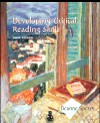 |  Developing Critical Reading Skills, 6/e Deanne Spears,
City College of San Francisco
Exercises
Chapter ObjectivesElements of Critical ReadingIn this first of the three critical reading chapters, you will learn to analyze and evaluate claims and evidence in arguments, building on the analytical skills developed in Parts I, II, and III. Critical reading goes beyond literal and inferential comprehension. It means judging the worth of what you read--its legitimacy as argument, its accuracy, fairness, reliability, and significance. The readings in Part IV represent the persuasive or argumentative mode of discourse--nonfiction prose that expresses a writer's subjective opinion, whether it is published in a newspaper or magazine editorial, a letter to the editor, a political speech, a position paper, or on a World Wide Web site. Chapter 8 covers these critical-reading skills:
 |  |  | The Reader's Responsibilities |
 |  |  | The Structure of Arguments |
 |  |  | The Importance of Defining Terms |
|



 2003 McGraw-Hill Higher Education
2003 McGraw-Hill Higher Education